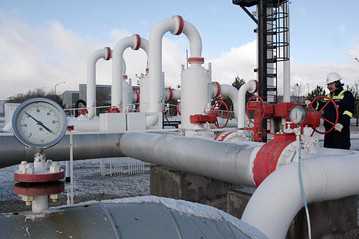By Joe Parkinson

ISTANBUL — Pundits in the U.S. regularly bemoan America’s “addiction to foreign oil” — but for a more unlikely energy addict, take a look at Turkey.
Turkey imports 87% of its petrol, 85% of its coal and a whopping 97% of its natural gas, meaning that when energy prices rise, the economy is exposed. So this year’s 20% gain in oil prices propelled by the wave of unrest sweeping the Middle East should have set the alarm bells ringing in Ankara.
But analysts at BGC capital partners say financial pain from spiralling oil is likely to take at least a year to fully feed through to Turkey’s real economy. That gives policymakers here valuable breathing room before national elections scheduled for June. But it also suggests that Turkey’s fast-growing economy could next year face a painful inflation spike and a further deterioration of its gaping current account deficit.
In a research note published Wednesday, BCG calculates that Turkey’s energy addiction cost it $91 billion last year, or 12.4% of gross domestic product. As a consequence, the economy’s dependence on energy imports means that for every $10 rise in Brent crude, Turkey’s growth will be reduced by up to 0.5%.
Turkey’s rapidly growing economy, which expanded 8.9% last year, could perhaps afford a little deceleration. Record low inflation in February and gradually falling unemployment underline the economy’s strong rebound from recession. But BCG research says surging oil prices could next year shock output, stocks and confidence. More troubling for Tukey’s policymakers: a sustained oil spike would further pressurize Turkey’s current account deficit — the achilles heel of the rapidly-growing economy.
Turkey’s current account deficit widened 247% to a record high of $48.6 billion last year as domestic demand boomed and imports dramatically outpaced exports. The swelling deficit has fed market concern that the economy could be exposed to a hard landing if external financing for the deficit dries up; fears that have been magnified by the high ratio of speculative investment, or hot money, used to finance the current account gap, which could quickly flee Turkey if sentiment turns negative.
BCG isn’t the only economic research house warning that spiking oil could aggravate Turkey’s imbalances. Neil Shearing, emerging markets economist at Capital Economics calculates that every $10 rise in the price of oil would add $6 billion — or 12% of the 2010 total deficit — to the funding gap.
But Shearing also stresses that Turkey’s persistently strong economic data is suppressing market concern over the current account, sending stocks rising in recent weeks and pushing the Lira to a near-four month year high on Wednesday.
“Turkey’s one of the big losers from higher oil prices, and everyone knows (the current account) is a risk. Its like we’re waiting for a trigger — I thought the middle east turmoil would be that trigger but it hasn’t been yet,” he said.
Turkey’s policy makers may be hoping for a more benign outcome — where a steadily rising oil price eats into household incomes, gradually helping to rein in booming consumer spending and moderate the current account deficit.
via Oil Spike May Take a While to Punish Energy-Hungry Turkey – New Europe – WSJ.

Leave a Reply